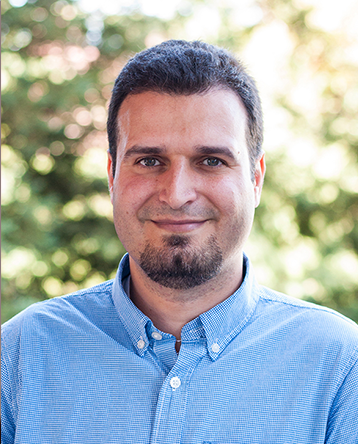Amir Barati Farimani
Russell V. Trader Associate Professor, Mechanical Engineering
Courtesy Appointments, Biomedical Engineering, Chemical Engineering, Machine Learning
Russell V. Trader Associate Professor, Mechanical Engineering
Courtesy Appointments, Biomedical Engineering, Chemical Engineering, Machine Learning

Amir Barati Farimani received his Ph.D. in 2015 in mechanical science and engineering from the University of Illinois at Urbana-Champaign. His Ph.D. thesis was titled “Detecting and Sensing Biological Molecules using Nanopores.” He extensively used atomistic simulations to shed light on the DNA sensing and detection physics of biological and solid state nanopores. Right after that, he joined Professor Vijay Pande’s lab at Stanford. During his post-doc, he combined machine learning and molecular dynamics to elucidate the conformational changes of G-Protein Coupled Receptors (GPCRs). He specifically was focused on Mu-Opioid Receptors to elucidate their free energy landscape and their activation mechanism and pathway.
The Barati Farimani’s lab, the Mechanical and Artificial Intelligence laboratory (MAIL), at Carnegie Mellon University is broadly interested in the application of machine learning, data science, and molecular dynamics simulations to health and bio-engineering problems. The lab is inherently a multidisciplinary group bringing together researchers with different backgrounds and interests, including mechanical, computer science, bio-engineering, physics, material, and chemical engineering. The mission is to bring the state-of-the-art machine learning algorithm to mechanical engineering. Traditional mechanical engineering paradigms use only physics-based rules and principles to model the world, which does not include the intrinsic noise/stochastic nature of the system. To this end, the lab is developing the algorithms that can infer, learn, and predict the mechanical systems based on data. These data-driven models incorporate the physics into learning algorithms to build more accurate predictive models. They use multi-scale simulation (CFD, MD, DFT) to generate the data.
2015 Ph.D., Mechanical Science and Engineering, University of Illinois at Urbana-Champaign
CMU Engineering
Amir Barati Farimani is teaching 3D printers to see, diagnose, and self-correct errors in real time using a new large language model. The AI-powered system works with any 3D printer to produce stronger parts and automate quality assurance.
CMU Engineering
Advancements in aerial additive manufacturing from the lab of Amir Barati Farimani could one day enable drones to construct remote infrastructure, maintain cities, and support space exploration.
CMU Engineering
CMU engineers and scientists undertook more than 45 research projects to develop artificial intelligence approaches to enable the use of metal additive manufacturing for the U.S. Army.
CMU Engineering
Researchers develop AlloyBert, a modeling tool designed to predict the properties of alloys.
CMU Engineering
Researchers have developed a novel ML model combining graph neural networks with transformer-based language models to predict adsorption energy of catalyst systems.
CMU Engineering
Carnegie Mellon University has awarded professorships to five exceptional faculty members in the College of Engineering.
Mechanical Engineering
CatBERTa, an energy prediction Transformer model, was developed by researchers in Carnegie Mellon University’s College of Engineering in an approach to tackle molecular property prediction using machine learning.
CMU Engineering
Researchers at CMU combined two vision foundational models—models trained on large visual data sets—to help a robot arm recognize the shape and the type of fruit and vegetable slices.
CMU Engineering
Four Ph.D. students in the College of Engineering have received funding to pursue research on valuable, relatively unexplored topics.
CMU College of Engineering
The 2023 Engineering Faculty Awards highlight faculty members who have shown outstanding educational, research, and service efforts. Congratulations to all of this year’s awardees!
CMU Engineering
Researchers at Carnegie Mellon University recently trained a robotic arm with human movements generated by artificial intelligence.
Mechanical Engineering
CMU researchers introduce MOFormer, a machine learning model that can achieve higher accuracy on prediction tasks than leading models without explicitly relying on 3D atomic structures.